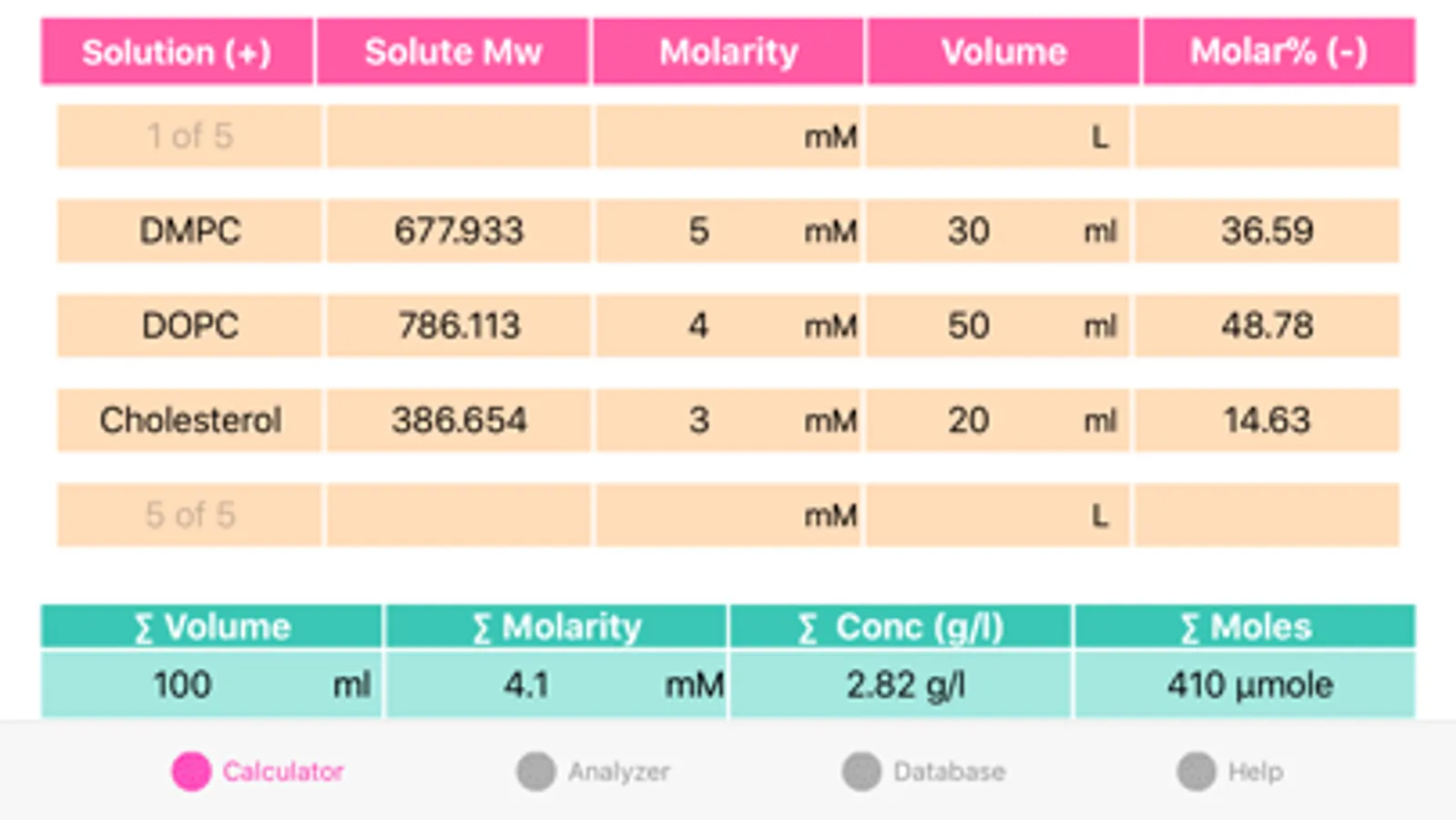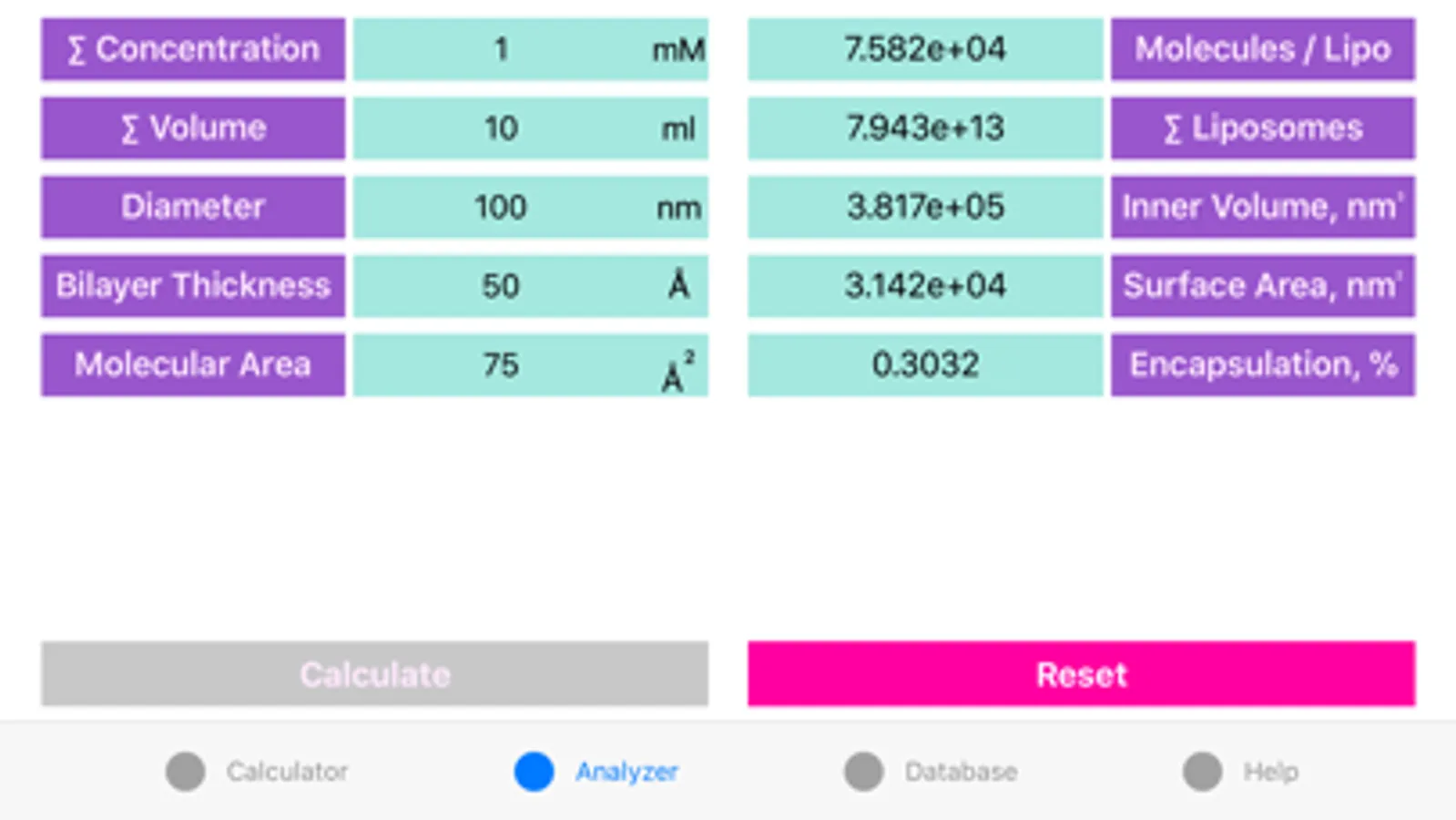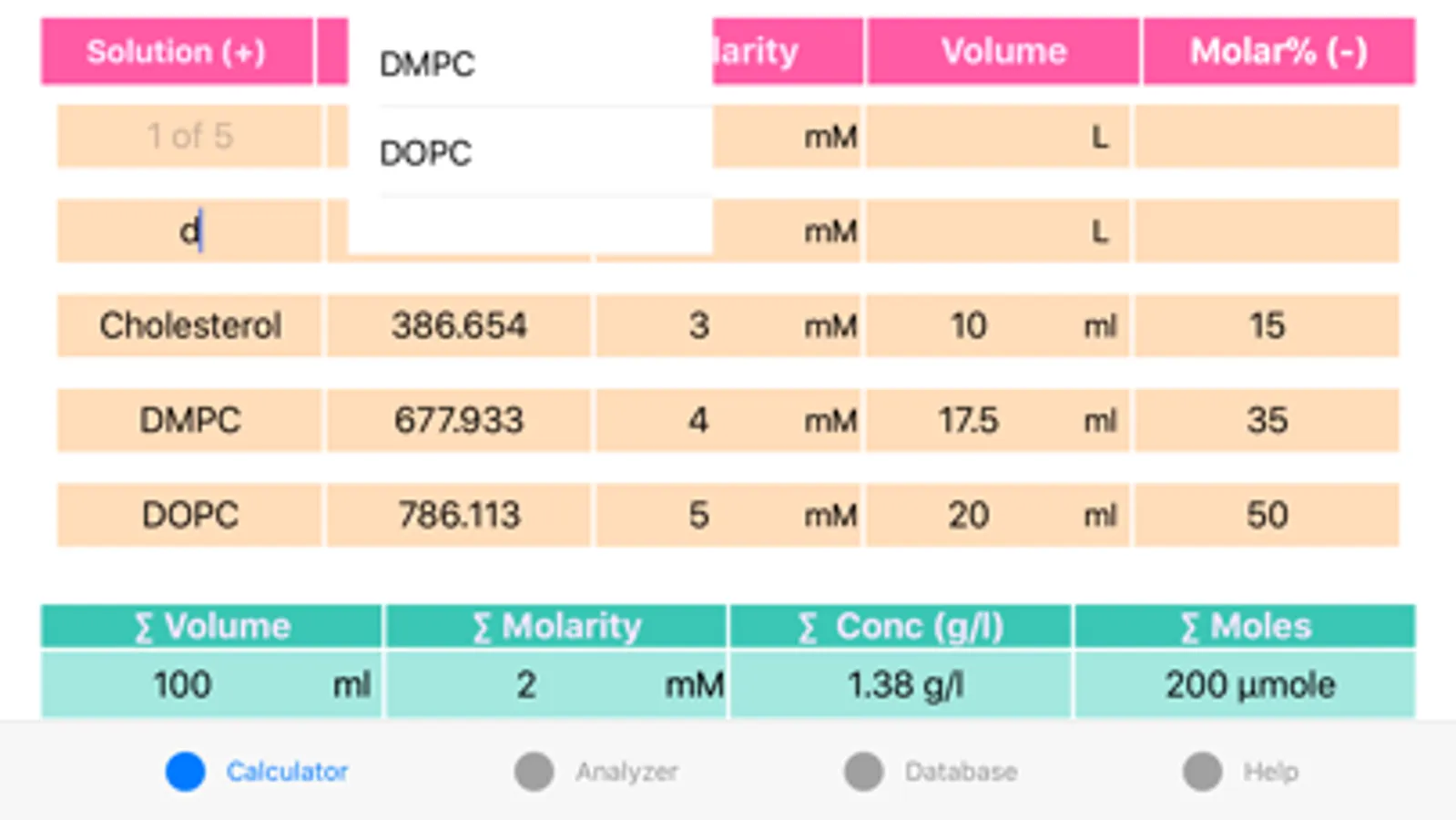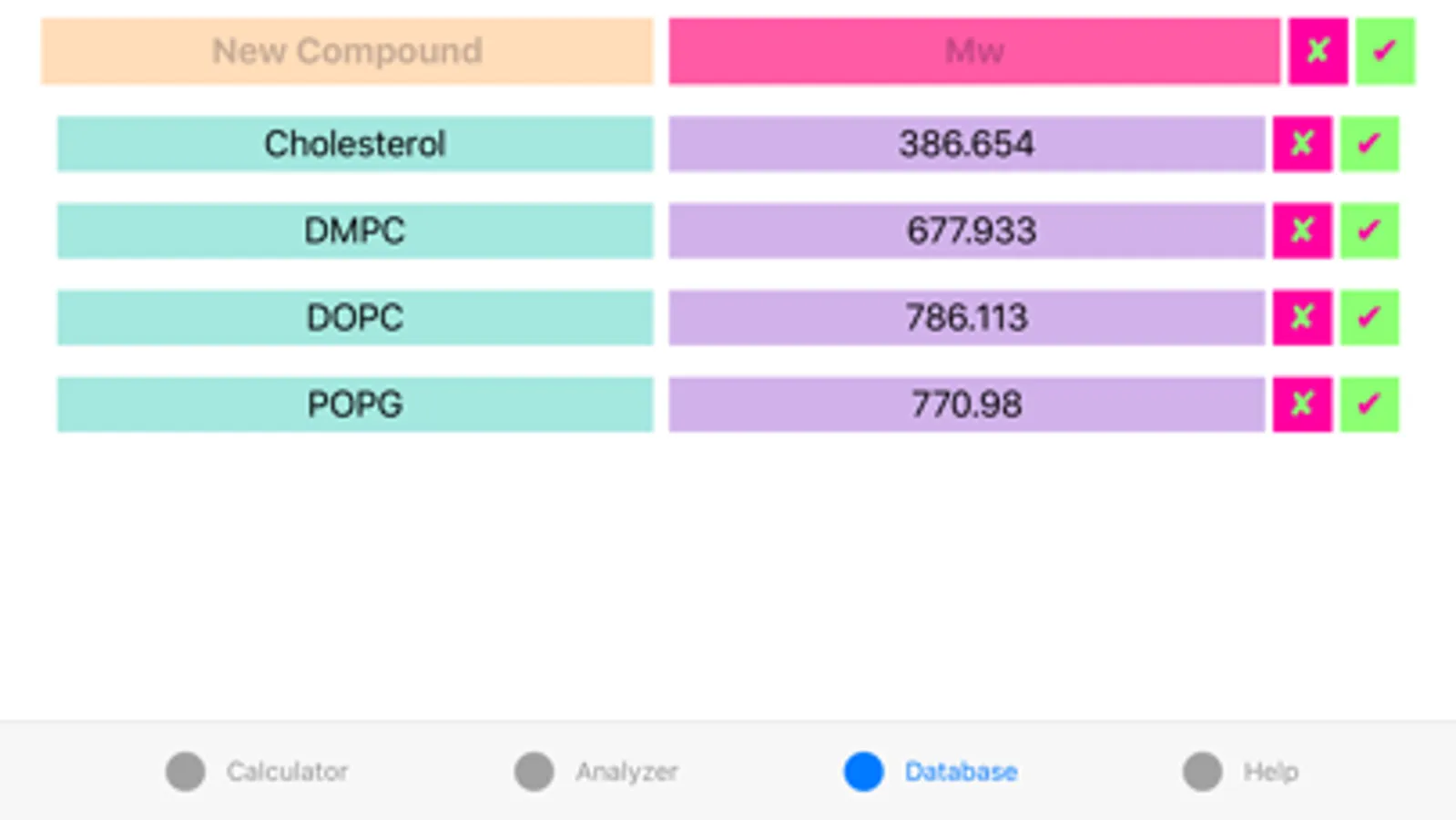About Liposome Calculator
Liposome Calculator helps in preparation of liposome solutions. Components concentrations (molarity and mg/ml) and moles, and volumes of stock solutions are calculated based upon data provided, such as: initial concentrations of the stock solutions, and required molar ratios.
Application is comprised of two activities: First is Calculator, that helps to parameterize and prepare the complex suspension systems. Second is Analyzer that helps in analysis of liposome parameters, such as number of molecules per vesicle, inner, entrapped volume and encapsulation.
The Calculator follows the common liposome preparation procedure (volard.wordpress.com):
1. Stock solutions of lipids (or any other compound) are mixed in appropriate molar ratios.
2.Obtained mixture is purged with nitrogen and organic solvent is finally evacuated under vacuum.
3.Obtained lipid mixture is hydrated and extruded or sonicated, according to the needs.
Calculator features:
Unlimited number of components is available. Additional components are added by touching “Solution# (+)” field and deleted by touching the “Molar% (-)” field.
Application is fully interactive: all system parameters are updated immediately after any input from user (if it is sufficient!). For example: final molar concentration and molar ratios of the components can be adjusted at any time if molar concentrations of starting solutions and final suspension volume are provided. Upon any of the aforementioned changes, the application will calculate the volumes of the initial solutions to fit the desired parameters.
The database is used to store compounds data, that will be available to autocomplete upon typing compounds' names in the main calculator.
Important points.
The user should follow the simple rule to ensure proper functionality: all known data should be provided in the following order (Only yellow fields are adjustable): solution or solute nicknames(optional)→ Mw (if needed)→ initial concentrations (must!)→ volumes (if known)→ molar ratios (if known)→ Total Molarity (if known)→ Total Volume (if known).
Sum of stock solution volumes doesn't have to be equal to final suspension volume (Refer to the procedure)!
Watch out the molar ratios to ensure that all starting components are included! Program will expel components for which insufficient data is provided! Thus, for example concentration in g/l cannot be included in calculations if Mw of solute is not provided.
Liposome Analysis Activity Layout:
The activity window divided to data panel (left) and results panel (right).
The data panel parameters:
Total Concentration: Total lipid concentration. Automatically uploaded from Liposome Calculator activity and can be corrected at any time.
Total Volume: Total solution volume. Automatically uploaded from Liposome Calculator activity and can be corrected at any time.
Diameter: Average liposome outer diameter in nanometers (one billionth of meter).
Bilayer Thickness: Lipid bilayer thickness in angstroms.
Molecular Area: Single lipid molecule area in square angstroms.
The results panel parameters:
Number of Molecules: Average number of lipid molecules in a single liposome (vesicle).
Number of Liposomes: Average total number of liposomes in the analyzed solution.
Inner Volume: Average volume entrapped in a single liposome.
Surface Area: Average surface area of a single liposome.
Encapsulation Efficiency: In this context is represented by ratio of the total entrapped volume to total solution volume. Look up for the definition in regards to the drug encapsulation.
Important Points.
Usage of high total concentrations (particularly in molar range) leads to an inappropriate system analysis (encapsulation efficiency values exceeding 100%), since physical state of system cannot anymore be considered as a dilute vesicle suspension.
Application is comprised of two activities: First is Calculator, that helps to parameterize and prepare the complex suspension systems. Second is Analyzer that helps in analysis of liposome parameters, such as number of molecules per vesicle, inner, entrapped volume and encapsulation.
The Calculator follows the common liposome preparation procedure (volard.wordpress.com):
1. Stock solutions of lipids (or any other compound) are mixed in appropriate molar ratios.
2.Obtained mixture is purged with nitrogen and organic solvent is finally evacuated under vacuum.
3.Obtained lipid mixture is hydrated and extruded or sonicated, according to the needs.
Calculator features:
Unlimited number of components is available. Additional components are added by touching “Solution# (+)” field and deleted by touching the “Molar% (-)” field.
Application is fully interactive: all system parameters are updated immediately after any input from user (if it is sufficient!). For example: final molar concentration and molar ratios of the components can be adjusted at any time if molar concentrations of starting solutions and final suspension volume are provided. Upon any of the aforementioned changes, the application will calculate the volumes of the initial solutions to fit the desired parameters.
The database is used to store compounds data, that will be available to autocomplete upon typing compounds' names in the main calculator.
Important points.
The user should follow the simple rule to ensure proper functionality: all known data should be provided in the following order (Only yellow fields are adjustable): solution or solute nicknames(optional)→ Mw (if needed)→ initial concentrations (must!)→ volumes (if known)→ molar ratios (if known)→ Total Molarity (if known)→ Total Volume (if known).
Sum of stock solution volumes doesn't have to be equal to final suspension volume (Refer to the procedure)!
Watch out the molar ratios to ensure that all starting components are included! Program will expel components for which insufficient data is provided! Thus, for example concentration in g/l cannot be included in calculations if Mw of solute is not provided.
Liposome Analysis Activity Layout:
The activity window divided to data panel (left) and results panel (right).
The data panel parameters:
Total Concentration: Total lipid concentration. Automatically uploaded from Liposome Calculator activity and can be corrected at any time.
Total Volume: Total solution volume. Automatically uploaded from Liposome Calculator activity and can be corrected at any time.
Diameter: Average liposome outer diameter in nanometers (one billionth of meter).
Bilayer Thickness: Lipid bilayer thickness in angstroms.
Molecular Area: Single lipid molecule area in square angstroms.
The results panel parameters:
Number of Molecules: Average number of lipid molecules in a single liposome (vesicle).
Number of Liposomes: Average total number of liposomes in the analyzed solution.
Inner Volume: Average volume entrapped in a single liposome.
Surface Area: Average surface area of a single liposome.
Encapsulation Efficiency: In this context is represented by ratio of the total entrapped volume to total solution volume. Look up for the definition in regards to the drug encapsulation.
Important Points.
Usage of high total concentrations (particularly in molar range) leads to an inappropriate system analysis (encapsulation efficiency values exceeding 100%), since physical state of system cannot anymore be considered as a dilute vesicle suspension.



